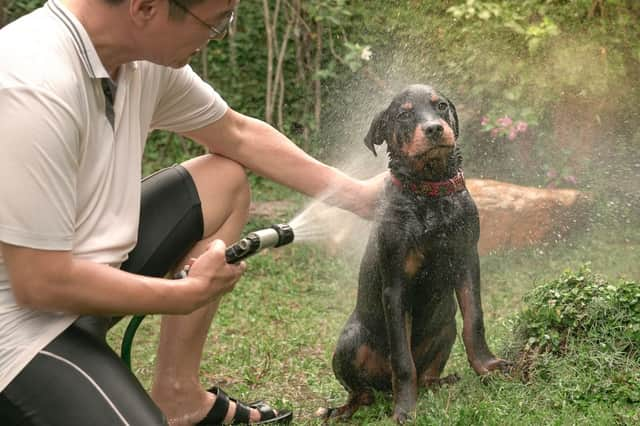Why Is My Dog Smelly? Here are the 5 most common reason for your adorable dog being stinky
This article contains affiliate links. We may earn a small commission on items purchased through this article, but that does not affect our editorial judgement.


When our canine companions are clean and healthy, their natural scent can be comforting for owners, with many people confessing that they love the way their dog smells.
So, when their scent is off and they’re giving off a bad smell that differs from the unpleasant but expected musk of a wet dog - it’s time to question why.
Advertisement
Hide AdAdvertisement
Hide AdWith this in mind, Dr Sean McCormack, Head Vet at tails.com has outlined several reasons that could be causing your four-legged friend to have a bit of a whiff, and how best to handle them.
Here's what he had to say.
Unclean Fur
One of the main reasons your dog might smell unpleasant could be down to their outdoor antics on your walk.
Dogs love to roll around in things that smell, and unfortunately, that often includes other animals' excrement. Whether it’s rabbit or fox poo, for our four-legged friends - the stinkier the better. Alternatively, your canine companion might have enjoyed having a swim in dirty water like a lake or jumping into muddy puddles.
A simple way to tackle the smell is with a good dog-friendly shampoo and a bath of warm water. This way you can easily remove any dirt and unpleasant odour, and leave your dog smelling fresh.
Ear Infections
Ear infections are frequent in our canine companions and can be a common reason for your dog being smelly. Ear infections often contain yeast, bacteria or sometimes both, which can contribute to your dog’s ears having a distinct foul-smelling, musty odour.
Alongside the smell, further tell-tale signs of an ear infection in your four-legged friend are itching and head shaking, alongside redness, swelling and discharge inside the ears. Ear infections can occur for a number of reasons, including allergies, poor hygiene, foreign bodies in the ear, and even breed predisposition.
The safest way to deal with an ear infection in your dog is with a trip to your veterinarian. They will be able to look inside your dog’s ears and prescribe ear drops or medication to treat the infection. They will also be able to provide you with advice on regular cleaning for your dog’s ears going forward.
Impacted Anal Glands
Impacted or infected anal glands can be another major cause of your dog giving off a foul smell. The anal glands are two sacs in the rectum’s wall that can fill up with a fishy-smelling liquid, as a result of a poor diet, soft stools or particular health conditions. Some breeds, especially small and toy breeds, are also genetically predisposed to anal glands filling and not emptying effectively over time.
Advertisement
Hide AdAdvertisement
Hide AdIf your dog is biting or licking their rear end, or scooting along the floor - these are usually additional signs that your dog’s anal glands are full.
You can take your dog to the vet or even qualified groomers to have their anal glands expressed, which should alleviate the problem and get rid of the smell. However, if your dog is frequently suffering from full anal glands, or there is any blood or severe pain (with your dog chewing/licking its back end excessively), it’s important to look into why this is occurring.
Skin Issues
If your canine companion is suffering from skin irritation or a skin infection, this can lead to irregular oil production, overgrowth of bacteria and yeast on the skin’s surface, which can produce a rather unpleasant smell.
There are various causes for your dog to have skin issues, including allergies, diet, hormonal imbalances, wounds, fungal infections, and external parasites.
To determine what is causing your dog’s skin issues, contact your veterinarian who can check your dog over in person and perform further tests to identify the condition (if required). You may be prescribed a medicated shampoo for your four-legged friend, antibiotics or treatments, to help manage the condition.
Bad Breath
While dog breath isn’t known to be the most pleasant smell in the world, it shouldn’t be unbearable either.
If your canine companion’s breath has a strong, foul stench, this could be due to poor dental hygiene. Plaque and tartar buildup can usually be prevented by regular tooth brushing, but if it has already built up to a level causing foul odour, your dog may need a dental cleaning by your vet.
If your dog’s breath isn’t a result of poor oral hygiene, it could indicate an underlying health problem. There are a variety of health issues that can impact a dog’s breath, including digestive issues, allergies, or in more serious cases diabetes, liver problems or kidney disease. Taking your four-legged friend to the vet is the best way to get to the bottom of things and receive the treatment your dog requires.
Comments
Want to join the conversation? Please or to comment on this article.